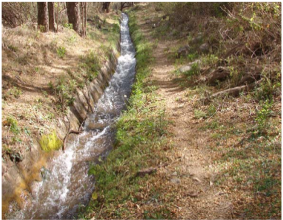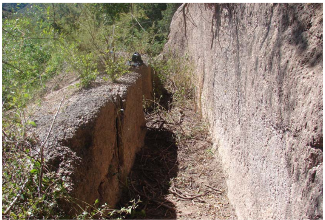The steering committee of the course "Ancestral hydrotechnologies as a response to the climate, health and food emergency", which took place from March 7 to March 14, 2022, organized by the UNESCO Chair on Sustainability at the UPC, in collaboration with the Cooperation Fund for Water and Sanitation (FCAS) of the AECID and the Water Education and Cultural Working Group of Latin America and the Caribbean and the Conference of Ibero-American Water Directors (CODIA), decides to nominate the winners in the two categories: a) for the best group project, and b) for the best video.

The main objective of the course was to present cases of intangible cultural heritage rescue linked to ancestral water management to adapt them to the current context of climate and health emergency, based on a participatory process of appropriation and co-design of Nature-Based Solutions.
The seminar was aimed at managers and senior technical specialists, university professors, researchers from public organizations in charge of supplying drinking water to the population, managing and investigating water resources, forests, agriculture and protected natural areas in the LAC area.
During the registration phase, 216 applications were received from participants from Argentina, Bolivia, Colombia, Costa Rica, Ecuador, Spain, Guatemala, Honduras, Mexico, Nicaragua, Panama, Paraguay, Peru, the República Dominicana, Uruguay and Venezuela. Finally, the course had 133 participants, 20 international speakers and 55 best practices proposals were presented.
Here you can download the course report: 2022 Course Report
At the end of the course, a pre-selection of 10 group work proposals was made. Each group had 2 months to prepare their final proposal to qualify for the Best Group Work Award. The steering committee of the course decides to award among the finalists two group work initiatives, and give a prize to the best video.
The selected works will be presented during the International Conference Ancestral Hydrotechnologies as a Response to the Climate, Health and Food Emergency in the Mediterranean, focused on the "Use of Cultural Heritage for the Rescue of the Future", which will take place in Barcelona, Catalonia, Spain, from February 16 to 17, 2023. More information here.
Best Group Work Award
First Prize | Revaluation of ancestral hydrotechnological knowledge to face the climate-environmental crisis in Antofagasta de la Sierra (Argentina) |
| Autores: Lorena Grana, Ágata Alcaraz, Carmen Paiva, Héctor Genaro, José Vicente Villegas, Laura Pallero, Lorena Sandoval, Thomas Zakaluk |
The project "Revaluation of ancestral hydrotechnological knowledge to face the climate-environmental crisis in Antofagasta de la Sierra (Argentina)" aims to rescue for the future the ancestral pre-Hispanic, technological and cultural knowledge on water management in desert areas, which can allow agricultural and silvopastoral flourishing in Antofagasta de la Sierra.
Taking as an example the realization of a replica of a pre-Hispanic dam found in the region, which together with the support of local family farms and scientific and technological organizations, allows the construction of demonstration modules that promote the transfer of ancestral technologies to low-income communities limited by the scarcity of water.
The project plans to work on the recovery of ancestral pre-Hispanic hydrotechnologies, analyzing the potential of their use in the area, based on an extensive analysis of the socio-economic activity in the area, analyzing the problems and potential use of these hydrotechnologies in arid and semi-arid areas.
On the other hand, the presentation has been made with an innovative format and design, taking advantage of the use of new technologies, to expand the information through the use of QR codes. For all these reasons, the committee decides to give to that group the first prize.

Second Prize | Ancestral techniques of the Shincal de Quimivil: Channels excavated in rocks |
| Autores: Lida Borello, Rosana Hammerly, María Verónica Lanzaro, Fiorella Macor, Viviana Martínez, Mariana Romanatti, Juan Pablo Zamora |
El Shincal is an archaeological site of an ancient city conquered by the tenth monarch of the Cuzco dynasty Topa Inka, built and administered by the Inca empire between 1471 and 1536, becoming the southernmost administrative capital of this empire with a political and highly significant religious This ancient city belonged to the Inca Trail (QhapacÑan), and was considered the most important capital in the southern part of the empire.
The project "Ancestral Techniques of the Shincal de Quimivil: Channels excavated in rocks" proposes a comprehensive Revaluation Project that consists of:
Planning and construction of a new place, designed and conceived as a site museum.
Building conditioning of the "interpretation center" (restaurant service, sale of local handicrafts, public toilets and space for outreach activities).
Interdisciplinary management plan to order and regulate the various activities carried out on the site in pursuit of research and conservation.
The project makes an excellent compilation of the studies developed since 2003 in the Quimivil river, in order to locate vestiges of agricultural and irrigation architecture, recording various sections of hydraulic architecture that irrigated large sectors of the alluvial cone. The ancestral technique consists of channels carved into large rock formations. The studies carried out allowed elucidating their function as a mechanism to "direct" the flow of water towards the cultivation sites. Surely, it also made it possible to reduce alluvium because the channels behaved like tools for correcting small streams. On the other hand, the channels took advantage on the use of groundwater, generating water outcrops from the fissured aquifer and ensured flows for irrigation, beyond the surface water supply.
The project presents a very adequate analysis of the potential of the use of these hydrotechnologies for climate adaptation, and the potential for replicability in the current context, with which it is decided to award the project with the second prize.

Best Video Award
Video First Prize | Las Jollas "Hydrotechnologies as a basis for agroecological practices in the Mezquital Hidalgo Valley, Mexico" |
| Ameyalli Bernal Gómez, Adriana Saldaña Espejel, Arnoldo Díaz Olavarrieta, Ismael Hernández, Santo T. Álvarez |
The steering committee of the course decides to select the documentary "Las Jollas. Hydrotechnologies as a basis for agroecological practices in the Valley of Mezquital Hidalgo, Mexico" from the short videos and documentaries sent to the 2022 AWARD for BEST VIDEO.


















Comments